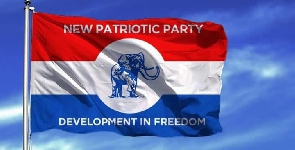Opinions of Sunday, 19 November 2023
Columnist: Isaac Ofori
Charting the course: NPP's strategic roadmap for success in Ghana's 2024 elections
As the 2024 elections approach, the New Patriotic Party (NPP) confronts a pivotal moment in Ghana's political landscape. Current indicators suggest a potential weakening of the party's stronghold, while opinion polls increasingly favour the National Democratic Congress (NDC), largely attributed to the economic challenges faced by the Ghanaian populace.
This raises a critical question: How can the NPP not only maintain its momentum but also achieve a significant breakthrough in the upcoming elections?
The path ahead for the NPP is fraught with challenges, necessitating a departure from complacency and a commitment to transformative action. The party's efforts to engage with the electorate, while commendable, may fall short unless they address the core issues impacting everyday Ghanaians.
Key to this is tackling the rising cost of living, particularly food inflation and the price of basic commodities. By enabling Ghanaians to achieve more with less financial strain, the NPP can demonstrate a tangible improvement in living standards, fostering a sense of hope and economic optimism as the 2024 milestone approaches.
Furthermore, the NPP's strategy must include a robust youth mobilization initiative. Engaging the youth demographic with meaningful opportunities and resonant messaging is crucial for galvanizing support and capturing power in the forthcoming elections.
This demographic's confidence in the economy and its prospects is a barometer of the party's success.
The NPP's internal dynamics also warrant attention. The party has experienced turbulence, necessitating a cautious approach by its executives to foster unity and loyalty. The management of influential figures within the party, such as Kennedy Agyapong and his followers, requires wisdom and discernment.
Similarly, the handling of Alan Kyerematen and his "butterfly movement" is a delicate matter that could significantly impact the party's cohesion.
In the broader context of Ghanaian politics, the cycle of underperforming governments must be broken. The NPP has the opportunity to set a new standard for governance, a blueprint for future administrations.
While the NDC presents itself as an alternative, it is imperative to critically assess its ability to address the nation's economic woes. Can the NDC effectively reduce the cost of living, manage fuel prices, and lower import duties? Are they equipped to reverse the current economic downturn?
These questions are essential in evaluating the NDC's readiness to assume power and effect meaningful change.
In this climate, the NPP's narrative must be one of scrutiny and comparison. By questioning the NDC's capacity to rectify the issues they frequently criticize and offering a viable alternative, the NPP can position itself as the only feasible option for Ghana's future.
This strategy, coupled with a commitment to restoring hope and prosperity for the average Ghanaian and the youth, could be pivotal in securing the NPP's success in the 2024 elections.
News

'Always wait for me to land' - Watch CJ's clash with Thaddeus Sory during anti-LGBT+ Bill hearing
Sports

Watch highlights of Real Madrid's dramatic comeback win against Bayern Munich in UCL semi-final
Entertainment

'Fadda Dickson called Medikal to apologize while MzGee is still unapologetic' – Shatta Wale
Opinions






